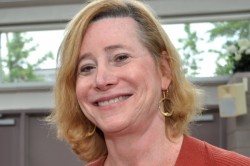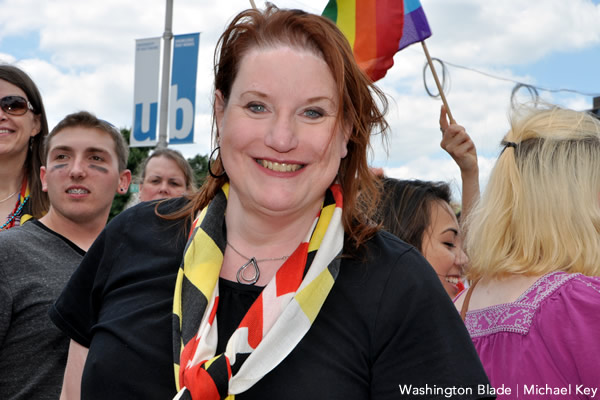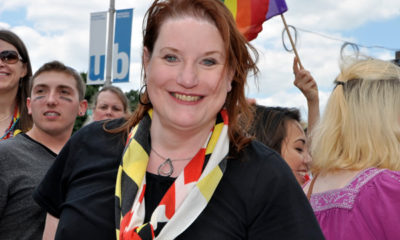Local
Gender Rights Maryland launches
Trans group gets rolling; Equality MD announces strategic plan


‘There’s never been a trans-focused politically directed organization in Maryland before,’ said Dana Beyer of Gender Rights Maryland. (Washington Blade photo by Michael Key)
Things continue percolating for LGBT activist groups in Maryland. Gender Rights Maryland, a new group dedicated to getting trans protection legislation passed, had its launch events last weekend. And this week Equality Maryland announced a strategic plan for how it plans to regroup and rebuild for the rest of the year.
On June 23, Gender Rights held a gathering at Blair Mansion Inn Restaurant in Silver Spring. According to Dana Beyer, the group’s volunteer executive director, about 60 attended.
“It was kicked off with a lot of enthusiasm,” Beyer said. “There was a nice broad spectrum of people there and it was very inspiring. There was definitely a sense that this was a historic event. There’s never been a trans-focused politically directed organization in Maryland before.”
Last weekend, the group’s organizers met with leaders from national LGBT groups based in Washington at the DoubleTree Hotel on Rhode Island Avenue, then on Sunday the board held its first meeting. The organization has a 16-member board but hopes to expand to 18.
Beyer, who co-founded the organization with four other transgender Maryland residents, says the group has been a dream of hers for years. A number of considerations, Beyer says, factored into the timing of the group’s formation — a public accommodations bill getting further along toward passage (though it ultimately fell one vote shy of what it needed) in the state’s most recent legislative session and the national media attention that a video received showing Maryland resident Chrissy Lee Polis getting beaten in a McDonald’s restaurant in April. Beyer says many in the group have assisted Polis in getting help. They say she’s doing well. Polis attended Baltimore Pride two weekends ago.
Also last week, Equality Maryland announced a six-month “strategic action plan” that the organization’s remaining five board members are enacting. The organization is in the midst of “a thorough self-evaluation” the release said. Recent months have been tumultuous for the group. Former director Morgan Meneses-Sheets was fired in April. Two LGBT bills — one for same-sex marriage and another for transgender accommodations — failed earlier this year. The board is about half the size it was six months ago. Only one person remains on staff, an office manager. Other employees of recent months had contracts that were not renewed, the board said. After June 30, the organization will have two staff members — an office manager and a gender identity field organizer — and plans to retain Lynne Bowman as a contractor and to add Andy Szekeres as a fundraising consultant.
“Over the past two months, the remaining members of the board have undertaken a thorough process of self-evaluation,” said Patrick Wojahn, chair of Equality Maryland Foundation, which leads the organization’s education efforts, in the announcement. “Through individual conversations, over a dozen Listening Tour stops and more than 1,200 responses to our online survey, we have actively gathered input about what people want to see from their statewide equality organization. We have coupled that input with the results of a comprehensive internal review and developed a strong six-month plan that will allow Equality Maryland to become the organization it must be in order to achieve legislative and cultural equality in our state.”
Board Chair Lisa Polyak mentioned several other goals, such as a “major” reconstitution of the board with “more diversity and a bigger skills set,” the hiring — tentatively slated for fall — of a new executive director with a new job description, financial stabilization and “more input from the community about what our mission should be.”
Polyak said board members have left for a variety of reasons. At least one resigned over the handling of Meneses-Sheets’ employment but another, Scott Davenport, moved out of the area and another took on more responsibilities at his job, Polyak said.
“It wouldn’t be fair to characterize it as any one thing,” she said.
Polyak said the formation of Gender Rights Maryland is a “natural evolution for the trans community” and cited other states, such as New York and Massachusetts, that have both state LGBT organizations and separate transgender political groups.
“I think it’s a great thing,” she said. “It ultimately gives more power to the issue of gender identity concerns, which, frankly, just based on numbers, is numerically small. It makes sense that they might have their own organization for protections. … We look forward to working with them.”
Did the Equality Maryland upheaval contribute to the formation of Gender Rights Maryland? Beyer, a former Equality Maryland board member, said “nothing in politics or life is ever completely isolated” and that it’s hard to quantify to what degree one series of events affected her group’s launch.
“Our desire, willingness and determination to start really had nothing to do with Equality Maryland,” she said. “But that’s not to say that the vacuum left by having no trans board members there and the organization having spent most of its political capital on marriage didn’t provide an opening for us to take off and grow … I think it was the time. The time was now for us to grow, regardless of the state of Equality Maryland.”
The group’s main priority is to pass a comprehensive gender identity anti-discrimination bill by the end of the 2012 legislative session.
And has the passage of same-sex marriage in New York cast this year’s Maryland failings in a harsher light? Gov. Martin O’Malley told regional news outlets a stronger stance on his part in support would “have kicked it into the gutter of partisan division.”
Polyak doesn’t buy it.
“When you see executive leadership that is fully invested in the passage of any law, the chances of its success are much higher and that’s what we saw in New York. Gov. Cuomo used his policy tools as well as the bully pulpit and in closed door meetings admonished senators that our families and our relationships are just as valid. He spoke from the heart and there’s no substitute for authenticity. If Gov. O’Malley would show similar heart when he speaks of the commitment to this bill that he says he possesses, if he really put his heart into it and made it part of his legislative package for 2012, it would pass. It’s not a partisan issue. Sen. Allan Kittleman, a Republican, has spoken very movingly of his commitment from a civil rights standpoint and we believe there are those of a similar mind in the House of Delegates.”
District of Columbia
Two charged with assaulting, robbing gay man at D.C. CVS store
Incident occurred after suspects, victim ‘exchanged words’ at bar

D.C. police just after 1 a.m. on April 10 arrested two men for allegedly assaulting and robbing a gay man inside a CVS store at 1418 P St., N.W., according to a police report and charging documents filed in D.C. Superior Court.
The charging documents state that the alleged assault and robbery occurred a short time after the three men “exchanged words” at the gay bar Number 9, which is located across the street from the CVS.
The arrested men are identified in the charging documents as Marquel Jose Diaz, 27, of Northwest D.C., and Lorenzo Jesse Scafidi, 21, of Elizabeth City, N.C. An affidavit in support of the arrest for Diaz says Diaz and the victim “were previously in a relationship for a year.”
Court records show Diaz was charged with Simple Assault, Theft Second Degree, and Possession of a Controlled Substance. The court records show the controlled substance charge was filed by police after Diaz was found to be in possession of a powdered substance that tested positive for cocaine.
Scafidi was charged with Simple Assault and Theft Second Degree, the court records show.
The D.C. police report for the incident does not list it as a suspected hate crime.
The court records show both men pleaded not guilty to the charges against them at a Superior Court arraignment on the day of their arrest on April 10. The records show they were released by a judge while awaiting trial with an order that they “stay away” from the victim. They are scheduled to return to court for a status hearing on May 21.
The separate police-filed affidavits in support of the arrests of both Diaz and Scafidi each state that the two men and the victim “exchanged words” inside the Number 9 bar. The two documents state that both men then entered the CVS store after the victim went to the store a short time earlier.
Scafidi “came into the CVS shortly after and entered the candy aisle and slammed Complainant 1 [the victim] to the ground causing Complainant 1’s phone to fall out of CP-1’s pocket,” one of the two affidavits says. It says Scafidi “again picked up CP-1 and slammed him to the ground.”
The affidavit in support of Diaz’s arrest says Diaz also followed the victim to the CVS store after words were exchanged at the bar. It says that after Scafidi allegedly knocked the victim down in the candy aisle Diaz picked up the victim’s phone, “swung on” the victim “while he was still on the ground,” and picked up the victim’s watch before he and Scafidi fled the scene.
Without saying why, the two arrest affidavits say Diaz and Scafidi returned to the scene and were arrested by police after the victim and at least one witness identified them as having assaulted and robbed the victim.
Attorneys representing the two arrested men did not respond to phone messages from the Washington Blade seeking comment and asking whether their clients dispute the allegations against them.
The victim also did not respond to attempts by the Blade to obtain a comment from him. The police report says the victim is a resident of Fairfax, Va.
District of Columbia
Bowser calls for ‘extraordinary’ response to reduction in D.C. budget
Impact on city funding for LGBTQ programs and grants unclear

D.C. Mayor Muriel Bowser on April 15 issued an executive order calling for “extraordinary actions,” including “significant cuts in District Government services,” to address a decision by Congress to cut the city’s current budget by $1.1 billion.
The nine-page executive order points out that these actions became necessary after the U.S. House of Representatives has so far declined to vote on a free-standing bill approved by the U.S. Senate last month that would restore the $1.1 billion D.C. budget cut initially approved by the House.
In addition to large-scale cuts in city services, the mayoral order says the congressionally imposed city budget cut will bring about city “hiring freezes, financial impacts to employees, reductions and terminations in contracts and grants, and closures of District Government facilities.”
The order adds, “These are unprecedented actions given that the District itself adopted and is able to implement a fully balanced budget, but they are necessary due to the Congressional cut to the District’s budget and its inaction in timely fixing its legislative error.”
The House adjourned this week on a recess until the end of April, and congressional observers say it is unclear whether the majority Republican House will take up the Senate bill to undo the D.C. budget cut when the House returns from its recess. President Donald Trump has called on the House to approve the bill to restore the full D.C. budget.
Among the D.C. LGBTQ organizations and those providing services to the LGBTQ community that receive D.C. government funding and that could be impacted by the budget cuts are Capital Pride Alliance, which is organizing WorldPride 2025 set to take place in D.C. next month; and Whitman-Walker Health, one of the city’s largest private healthcare organizations that provides medical services for LGBTQ clients.
Also receiving city funding are the Wanda Alston Foundation, which provides housing services for LGBTQ people; and the LGBTQ youth advocacy and services organization SMYAL.
Spokespersons for the four organizations couldn’t immediately be reached to determine if they knew whether the soon-to-be implemented budget cuts would have an impact on the city funding they currently receive.
In response to questions from news reporters during an April 15 press conference call to discuss the Bowser executive order, Jenny Reed, director of the D.C. Office of Budget and Performance Management, said details on specific programs or funding allocations set to be cut would not be known until the mayor submits to the D.C. Council her Supplemental FY 2025 budget along with her proposed FY 2026 budget.
Reed was joined at the press briefing by Lindsey Parker, Mayor Bowser’s chief of staff; and Tomas Talamante, director of the Office of Intergovernmental Affairs.
They and other city officials have said the impact of the congressionally imposed city budget cut was expected to be lessened but remain highly problematic by Bowser’s decision to invoke a 2009 law that allows the city to increase its own spending without approval by Congress under certain circumstances.
The mayor has said under that law, the city would need to cut its FY 2025 budget by $410 million rather than by $1.1 billion. It couldn’t immediately be determined whether House Republicans, who initiated the requirement that the D.C. budget be cut by $1.1 billion, would challenge the mayor’s plan to invoke the 2009 law to reduce the size of the budget cut.
“Without the ability to fully execute the Fiscal Year 2025 budget as adopted and approved by the District, this gap will force reductions in critical services provided by our largest agencies, including the Metropolitan Police Department and the Fire and Emergency Medical Services Department,” the mayor’s executive order states.
“The District will continue to work with members of the House of Representatives to urge them to vote to fully restore the District’s Fiscal year 2025 budget and will continue to work with President Trump to strongly encourage the House of Representatives to take that action,” the order says.
District of Columbia
LGBTQ budget advocates fight for D.C. resources in a tough fiscal year
‘Trying to preserve life-saving services’ amid $1 billion cut

The months and days leading up to June are especially busy for LGBTQ Washingtonians. For one group, the DC LGBT Budget Coalition, which works year-round to ensure LGBTQ residents are represented and financially supported by the D.C. government, this time of year is their Super Bowl. Beginning in April, the D.C. Council and Mayor’s Office hold budget hearings for the next fiscal year.
With D.C.’s budget now under review, the Washington Blade spoke with Heidi Ellis, coordinator of the DC LGBT Budget Coalition, about the group’s top priorities and their push to ensure continued support for queer communities.
“The LGBTQ Budget Coalition was founded in 2020 at the height of the pandemic, as a way for the community to work together to advocate for key funding and policy changes,” Ellis said. “We recognized we were stronger together. A lot of groups are often pitted against each other for resources and dollars. This coalition was founded out of a need for unity. Since then, we’ve successfully advocated for more than $20 million in dedicated LGBTQ investments.”
In addition to coordinating the coalition, Ellis is the founder and CEO of HME Consulting & Advocacy, a firm that helps build coalitions and advance policy initiatives that address intersectional issues in the LGBTQ community. One of its most powerful tools, she explained, is direct outreach through community surveys.
“We actually do community surveys to see what people need and what’s top of mind,” Ellis said. “Of course, we also pay attention to the broader political landscape — like the current threats to HIV funding. That helps us prioritize.”
Because the coalition is comprised of more than 20 organizations across various sectors —healthcare, housing, community organizing — Ellis said its diversity enables it to connect grassroots needs to potential policy solutions.
“Our coalition includes service providers, community groups, health and housing advocates-folks who are deeply plugged into what’s happening on the ground,” she said. “They help determine our direction. We know we don’t represent every queer person in D.C., but our coalition reflects a wide range of identities and experiences.”
The insights gathered through those surveys ultimately inform the coalition’s annual budget proposal, which is submitted to the Council and mayor.
“That’s how we got to our FY26 priorities,” she said. “This year, more than ever, we’re fighting to protect what we’ve already secured — funding and policies we’ve had to fight for in the past. We know there’s concern around this budget.”
One of the challenges this year is that the D.C. government’s operating budget and some of its legislation must be approved by Congress. With a projected decline in tax revenue and a Republican-controlled Congress that has historically opposed LGBTQ funding, the Coalition has had to think strategically.
“Even before the situation on the Hill, the CFO projected lower revenue,” Ellis said. “That meant cuts to social programs were already coming. And now, with the $1 billion slashed from D.C.’s budget due to the continuing resolution, we’re not only fighting for D.C.’s budget and autonomy, but also trying to preserve life-saving services. Our message is simple: Don’t forget about queer people.”
This year’s proposal doesn’t include specific dollar figures. Instead, the Coalition outlines five funding priority areas: Healthcare, Employment & Economic Equity, Housing, Safety & Community Support, and Civil Rights.
Why no exact amounts? Ellis said it’s because not all solutions are financial.
“Some of our asks don’t require new funding. Others build on existing programs-we’re asking whether the current use of funds is the most effective. We’re also proposing policy changes that wouldn’t cost extra but could make a real difference. It’s about using what we have better,” she said.
When drafting the proposal, the Coalition tries to prioritize those with the most pressing and intersecting needs.
“Our perspective is: If we advocate for the most vulnerable, others benefit too,” Ellis said. “Take LGBTQ seniors. Some may have done well in life but now face housing insecurity or struggle to access affordable healthcare. Many in our coalition are elders who fought on the frontlines during the AIDS epidemic. They bring critical historical context and remind us that Black and brown communities bore the brunt of that crisis.”
“I love our coalition because it keeps us accountable to the moment,” she added. “If we center those most marginalized, we can make an impact that lifts everyone.”
In addition to healthcare and housing, safety remains a top concern. The Coalition has fought to maintain funding for the Violence Prevention and Response Team (VPART), a city-supported group that includes MPD, community-based organizations, and the Mayor’s Office of LGBTQ Affairs. VPART responds to crimes affecting the LGBTQ community and connects victims to legal, healthcare, and housing services.
“We’ve pushed to make VPART more proactive, not just reactive,” Ellis said. “The funding we’ve secured has helped survivors get the support they need. Cutting that funding now would undo progress we’re just beginning to see.”
At the end of the day, Ellis emphasized that this process is about far more than spreadsheets.
“A budget is a moral document,” she said. “If we’re not represented, you’re telling us our lives don’t matter at a time when we need protection the most. When people can’t get food, medicine, housing — that has a devastating impact. These are vital services.”
The DC LGBT Budget Coalition is urging residents to support a letter-writing campaign to D.C. Council members and the mayor. You can send a letter here: https://actionnetwork.org/letters/fully-fund-dcs-lgbtq-communities
Read the full FY26 budget proposal here: https://drive.google.com/file/d/1bTrENnc4ZazJTO6LPrQ3lZkF02QNIIf1/view
-

 The White House5 days ago
The White House5 days agoWhite House does not ‘respond’ to reporters’ requests with pronouns included
-

 District of Columbia2 days ago
District of Columbia2 days agoReenactment of 1965 gay rights protest at White House set for April 17
-

 Hungary2 days ago
Hungary2 days agoHungarian MPs amend constitution to ban public LGBTQ events
-

 Maryland2 days ago
Maryland2 days agoFreeState Justice: Transgender activist ‘hijacked’ Moore’s Transgender Day of Visibility event










